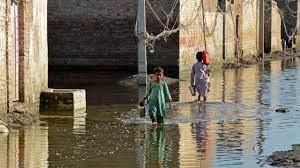
One year after catastrophic floods devastated swathes of Pakistan, some 4 million children in the South Asian nation remain without access to safe water, the United Nations children’s agency has warned.
In a news release Friday, UNICEF said it estimates that there are 8 million people in the country, around half of whom are children, who continue to live in flood-affected areas without clean water.
“Vulnerable children living in flood-affected areas have endured a horrific year,” Abdullah Fadil, UNICEF Representative in Pakistan, said in the statement.
“They lost their loved ones, their homes and schools. As the monsoon rains return, the fear of another climate disaster looms large. Recovery efforts continue, but many remain unreached, and the children of Pakistan risk being forgotten.”
Flooding caused by record monsoon rains and melting glaciers in Pakistan’s northern mountain regions last year claimed the lives of nearly 1,600 people – more than a third whom were children – and impacted an estimated 33 million more.
The floods submerged a third of the country, with the force of the floodwater washing away homes, leaving tens of thousands stranded on the road without any food to eat or clean water to drink.
About 30,000 schools, 2,000 health facilities and 4,300 water systems were damaged or destroyed, UNICEF said.
“The climate-related disaster deepened pre-existing inequities for children and families in affected districts,” UNICEF said in the statement. “One third of children were already out of school before the floods, malnutrition was reaching emergency levels and access to safe drinking water and sanitation was worryingly low.”
As the floodwater began to recede, a plethora of water-related diseases began to infect thousands – many of whom were children. Parents desperately tried to seek help as their children became infected with diarrhea, dysentery, dengue fever and malaria.
The flooding came as Pakistan was already grappling with a severe economic crisis, further compounding the economic misery of millions, pushing families into poverty and leaving many unable to afford essentials such as food, fuel and medicines.
The country’s predicament has been further complicated by political turmoil that has engulfed the nation in recent months after former Prime Minister Imran Khan was arrested on corruption charges, sparking deadly protests.
Khan was dramatically ousted from power in a no-confidence vote last year, after numerous accusations of bad governance, including economic mismanagement. He claims the allegations against him are political and being steered by the country’s powerful military.
Last month, the International Monetary Fund (IMF) approved a $3 billion bailout for Pakistan, giving the cash-strapped country a moment of reprieve in what has been a tumultuous year.
Source: CNN
 FR
FR EN
EN AR
AR








